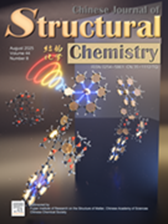
Cover Picture
Metal-coordinate complexes (M = 3d, 4f) with enhanced circularly polarized luminescence in planar chiral pillar[5]arenes
Yu Tian, Yijun Lin, Siyu Deng, Yinghe Tan, Xuanyi Bie, Zhaoyang Chen, Pangkuan Chen* Submit a Manuscript
Metal-coordinate complexes (M = 3d, 4f) with enhanced circularly polarized luminescence in planar chiral pillar[5]arenes
Yu Tian, Yijun Lin, Siyu Deng, Yinghe Tan, Xuanyi Bie, Zhaoyang Chen, Pangkuan Chen* Submit a Manuscript
Polymeric carbon nitride for photocatalytic overall water splitting: Modification strategies and recent advances
Anna Dai, Zhenxiong Huang, Li Tian, Zheng Zhang, Xiangjiu Guan*, Liejin Guo*
Chin. J. Struct. Chem., 2025, 44(8), 100630. DOI: 10.1016/j.cjsc.2025.100630
August 1, 2025
Photocatalysis; Overall water splitting; Hydrogen production; Polymeric carbon nitride; Modification strategies
ABSTRACT
Solar-driven photocatalytic overall water splitting (POWS) has emerged as a sustainable pathway for hydrogen production, yet faces intrinsic challenges in developing robust catalysts that balance efficiency, stability, and cost-effectiveness. Polymeric carbon nitride (PCN) represents as a promising metal-free photocatalyst for hydrogen production, due to the merits of unique electronic structure and exceptional thermal stability. Nevertheless, limited by rapid charge recombination and insufficient oxidative capability, little success has been achieved on pristine PCN photocatalyst in POWS. In this context, recent advances have demonstrated multi-dimensional modification strategies for improved POWS performance. Based on the fundamental principles of photocatalysis, this review discusses the advantages and challenges of PCN-based photocatalysts in POWS systems. With critical evaluation on one-step excitation systems and Z-scheme two-step excitation systems, modification strategies including crystallinity engineering, supramolecular precursor design, cocatalyst modulation, and construction of PCN-based heterojunctions and homojunctions were highlighted by introducing representative advances in POWS application over the past five years. Future perspectives for PCN-based photocatalysts are proposed, aiming to provide new insights for the design of advanced photocatalytic system for efficient POWS.







